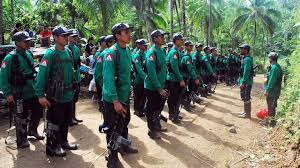Manila: Radical groups involved in the failed siege in Marawi City have forged a tactical alliance with mainstream communist insurgents, a security analyst said.
Dr Rommel Banlaoi, of the Philippine Institute for Peace, Violence and Terrorism Research (PIPVTR), told a recent security forum that remnants of the Maute group and an Abu Sayyaf faction associated with the late Isnilon Hapilon and a Moro group disgruntled with the current efforts at hammering out a Bangsamoro Basic Law (BBL), have forged a tactical alliance with the communist New Peoples’ Army (NPA).
He identified the other Moro groups as the Dawlah Islamiyah and a faction of the Bangsamoro Islamic Freedom Fighters (BIFF). These are also supported by radical volunteers from Indonesia, Malaysia and other Muslim countries.
“Government agencies involved in security bared this recent development which could have implications on the current government campaign against the groups behind the Marawi adventure and the CPP-NPA [Communist Party of the Philippines-NPA],” Banlaoi said during a lecture last week on national security at the National Defence College of the Philippines.
On December 5, President Rodrigo Duterte issued a proclamation designating the CPP-NPA a “terrorist organisation”.
In doing so, Duterte drew on Philippine law Republic Act No. 10168, also known as “The Terrorism Financing Prevention and Suppression Act of 2012”, which also criminalises the financing of terrorism.
“Declaring the CPP-NPA as a designated /identified terrorist organisation is nothing new. On August 9, 2002, the United States of America [had] designated the CPP-NPA as a foreign terrorist organisation (FTO) and to date continues to include the CPP-NPA in its list of FTOs,” the proclamation stated.
The decision by the President to declare the CPP-NPA a terrorist group also means that the government could call on other countries to deny the local insurgency movement support from other countries and to identify and expose the group’s covert financial lifelines.
Before Duterte’s declaration, the government had wooed the insurgents to the peace negotiating table. However, persistent attacks carried out on government forces as well as businesses compelled the President to call off the peace negotiations and order a return to the campaign versus the rebels.
These development also comes at the back of reports that radical groups, this time led by the Dawlah Islamiyah, are planning an attack similar to the May 23 uprising in Marawi City.
“Our intelligence agencies have monitored continued recruitment activities in the South,” Presidential Communications Secretary Martin Andanar said in a report over radio station dzBB on Sunday.
Earlier, it had been noted that groups that took part in the May 23 uprising in Marawi City are trying to capitalise on the continued foot dragging by legislators on the BBL.
The BBL had been envisioned by the current Duterte administration as well as that of his predecessor, President Benigno Aquino III, as a solution to end decades of conflict in the South.
Parts of the southern main island, particularly Central Mindanao and Western Mindanao, remain among the most impoverished regions in the country.













